South African outrage over Ryanair language testpublished at 16:59 BST 6 June 2022
Many black South Africans associate the Afrikaans language with white-minority rule.
Read MoreMany black South Africans associate the Afrikaans language with white-minority rule.
Read More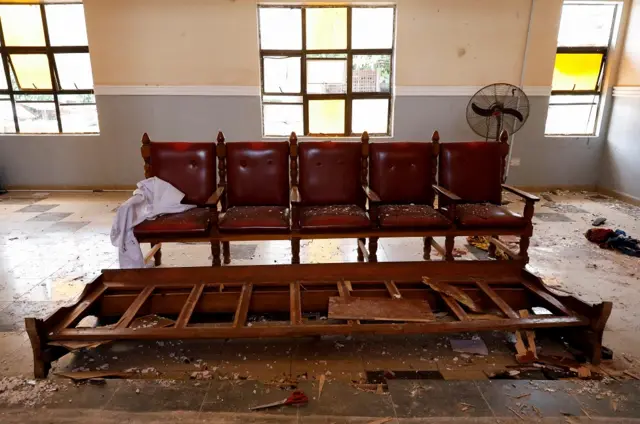 Image source, Reuters
Image source, ReutersPhotographs taken inside the church after the attack show the destruction
In Nigeria, Ondo state Governor Rotimi Akeredolu has declared a week of mourning during which flags will fly at half-mast following Sunday’s attack at St Francis Catholic church.
Officials have not given a death toll, but eyewitnesses have said at least 25 people were killed.
The Bishop of the Catholic Diocese of Ondo says the attacked church, which is one of the biggest parishes in Ondo state, can hold up to 1,200 people.
Bishop Jude Arogundade called on the government to beef up security and arrest those behind the attack.
Nigeria’s medical association is calling on locals to go to nearby hospitals, where people are receiving treatment, to donate blood.
Read more on the attack:
David Bamford
BBC World Service Newsroom
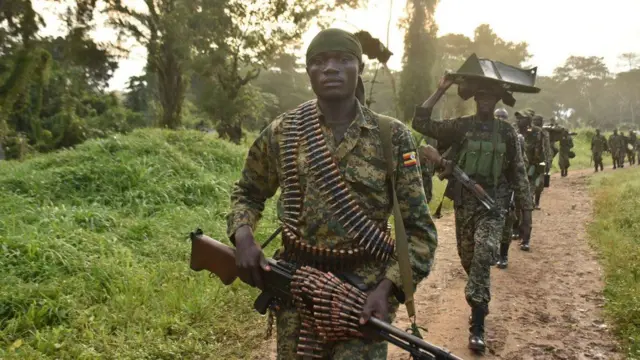 Image source, UPDF
Image source, UPDFUganda sent a force over the border to deal with the Allied Democratic Forces militia
Reports from the east of the Democratic Republic of Congo say about 20 people have been killed in a raid on a village.
A local chief and aid agencies said fighters belonging to the rebel Allied Democratic Forces (ADF) killed residents and burned down houses in the village in Ituri province.
The ADF is a Ugandan militia group that moved to eastern Congo in the 1990s.
A UN report says it's killed hundreds of people there.
Uganda has sent soldiers to the area to help fight the ADF, and last week the two countries extended their joint operation launched late last year.
Further south in North Kivu province, fighting is continuing between the Congolese army and the M23 rebel group - which the Congolese allege is supported by Rwanda.
Read more on Uganda's force in DR Congo:
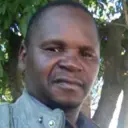 Jose Tembe
Jose Tembe
BBC News, Maputo
Mozambique has banned the import of animals, animal products and animal by-products from Zimbabwe following a resurgence of foot-and-mouth disease in the neighbouring country.
The authorities have also banned the importation of fodder for cattle, goats, pigs and sheep.
It comes says after Zimbabwean authorities confirmed an outbreak of the disease in Mashonaland Central province which borders Mozambique.
Mozambique's agriculture ministry said it would monitor the movement of animals and the banned products along the main border and points of road entry into the country.
It will also carry out mandatory inspections of all cattle, goats, sheep and pigs on the border districts.
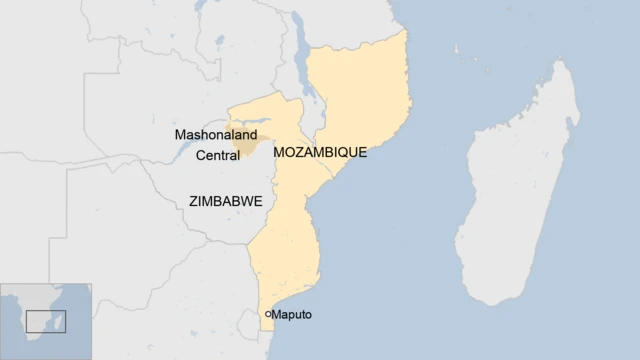
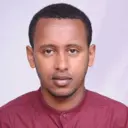 Ameyu Etana
Ameyu Etana
BBC Afaan Oromoo
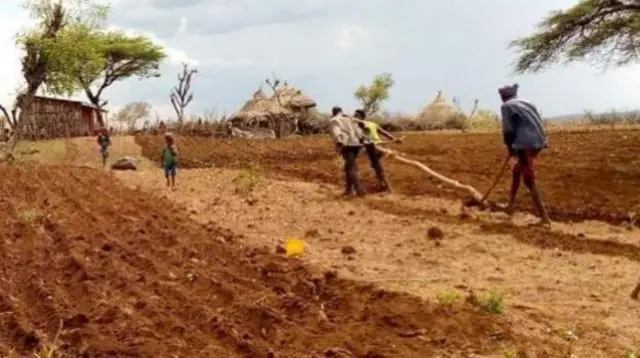 Image source, Duba Burra
Image source, Duba BurraThe farmers lost the oxen because of the ongoing drought
Farmers in the south of Ethiopia have received support from people in the country and abroad after videos of them doing an ox's job of pulling a plough were widely shared.
They had lost their livestock because of the ongoing drought that is affecting countries across the Horn of Africa.
Since the BBC reported the story in April, farmers in Taltalle area of Borena zone, an area known for breeding cows, have got help.
"Now we’re relieved after we got oxen. I was given two oxen," Tura Bobba told the BBC.
Another farmer, Kende Boru, also got help.
"We did plough like oxen because we were left without an option," he said.
Both farmers said the oxen they were given were young and they’re training them so that they will be able to plough the fields.
YouTuber Abbe Tokkichaw, who helped raise money for the farmers, told the BBC that he had managed to supply 58 oxen to 29 farmers.
The UN said the drought, which is worst in 40 years, has killed more than 1.5 million cattle across Ethiopia, and forced 200,000 people to leave their homes.
Read more on the drought:
South African bowler Mondli Khumalo was hospitalised after being assaulted near a pub.
Read More Jose Tembe
Jose Tembe
BBC News, Maputo
An extradition treaty signed last week between Mozambique and Rwanda has raised fears among Rwandan political refugees living in the southern Africa country.
The deal was signed by the justice ministers of the two countries in Rwanda's capital, Kigali.
Allow X content?
This article contains content provided by X. We ask for your permission before anything is loaded, as they may be using cookies and other technologies. You may want to read X’s cookie policy, external and privacy policy, external before accepting. To view this content choose ‘accept and continue’.
Approximately 3,000 Rwandan refugees are living in Mozambique, according to the authorities here.
Those who fled from Rwanda for political reasons fear that the treaty would be used to legitimise their forced repatriation.
They requested not to be identified or comment further on the treaty.
In September 2021, Rwandan businessman Revocant Karemangingo was shot dead in Mozambique's capital, Maputo, under unclear circumstances.
He was a prominent critic of Rwandan President Paul Kagame.
Patricia Oyella
BBC News, Kampala
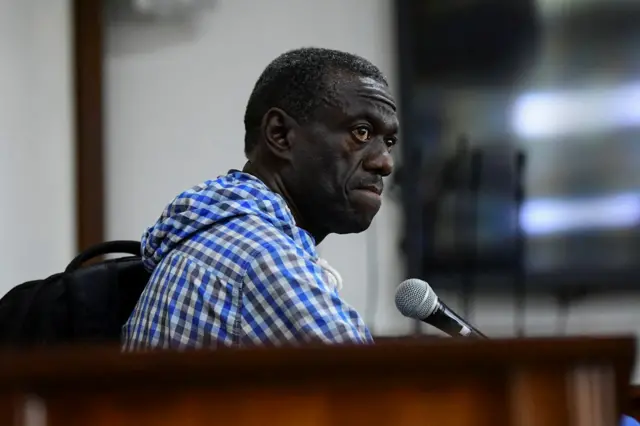 Image source, Reuters
Image source, ReutersKizza Besigye appeared in court on 25 May
The High Court in Uganda's capital, Kampala, has ruled that a bail condition set for detained veteran opposition leader Kizza Besigye was harsh, excessive and a miscarriage of justice.
Dr Besigye has been in detention since 24 May. He was charged with inciting violence after he tried to mobilise people in downtown Kampala to protest against the rising cost of living.
The court ruling follows a challenge by the politician's lawyers over the $8,000 (£6,400) cash bail imposed by a magistrate’s court.
Dr Besigye had refused to pay the sum and was remanded in prison until 16 June.
High Court judge Micheal Elubu said bail terms must not be set so high as to be out of reach or punitive.
He revised the figure down to $800 and maintained other conditions set by the trial magistrate.
Six women activists who demonstrated days after Dr Besigye's arrest to demand his release and against the rising cost of essential goods are also currently in detention.
They were charged with inciting violence and return on Tuesday for a hearing of their bail application.
They include MP Anna Adeke, Kampala Deputy Lord Mayor, Doreen Nyanjura, and Susan Nanyonjo, a mother of a three-month-old baby.
Kalkidan Yibeltal
BBC News
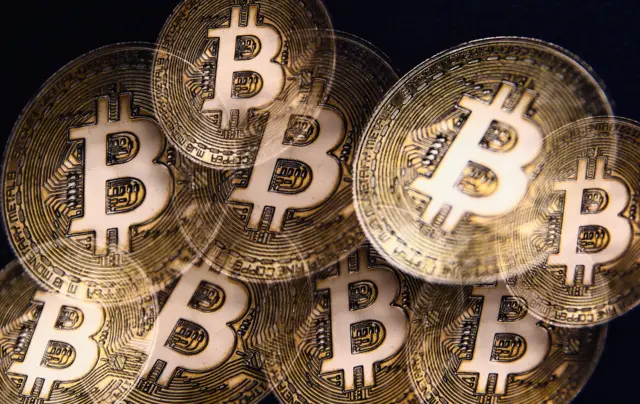 Image source, Getty Images
Image source, Getty ImagesEthiopia's central bank says cryptocurrencies are an avenue for hiding illicit funds
Ethiopia’s central bank has warned against trade in cryptocurrencies.
In a statement issued on Monday, the National Bank of Ethiopia (NBE) said the use of cryptocurrencies like Bitcoin was becoming prevalent despite being against the law.
It said this was creating favourable conditions for hiding illicit funds.
The bank has vowed to take measures against those using cryptocurrencies.
Read more about the Central African Republic and Bitcoin:
South Africa's President Cyril Ramaphosa has made a robust defence of his integrity after he was accused of being involved in kidnapping and bribery.
Last week, former spy chief Arthur Fraser said the case related to the alleged attempted theft of $4m (£3.2m) in 2020 at one of the president's properties and the alleged efforts to conceal what happened.
The president then confirmed that there was a robbery at his farm in Limpopo "in which proceeds from the sale of game were stolen". But then questions were raised as to why he had that sum in cash.
Talking to supporters at the weekend, Mr Ramaphosa explained that as a farmer he frequently bought and sold cattle and people often paid in cash. In addition, he denied that the amount stolen was anywhere near $4m.
"All this was money from proceeds from selling animals... I have never stolen money from anywhere... and will never do so."
Allow X content?
This article contains content provided by X. We ask for your permission before anything is loaded, as they may be using cookies and other technologies. You may want to read X’s cookie policy, external and privacy policy, external before accepting. To view this content choose ‘accept and continue’.
Mr Ramaphosa replaced Jacob Zuma as the country's head of state in 2018 after Zuma was forced to step down amid corruption allegations.
The president has made combatting corruption a priority of his government. But his commitment to this has been questioned as the misuse of state funds, especially over money earmarked for fighting Covid-19, has continued during his presidency.
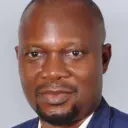 Chris Ewokor
Chris Ewokor
BBC News, Abuja
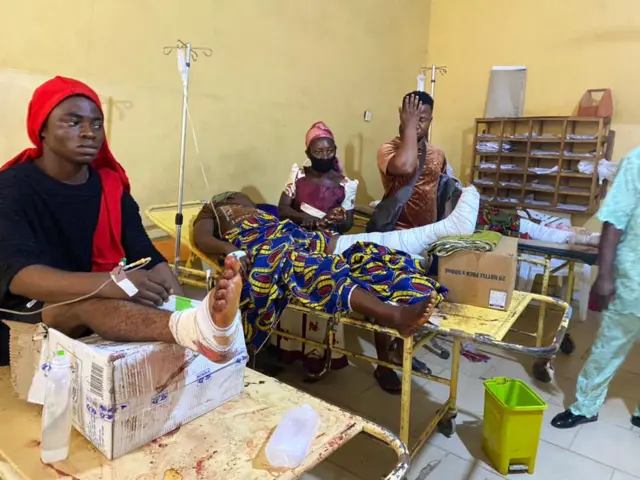
Survivors from Sunday's attack are being treated in the Federal Medical Centre in Owo
Nigerians remain in shock. The attack was horrific.
Relatives of the slain worshippers are inconsolable.
The attack has struck fear into the hearts of many people including Christians and church leaders.
Graphic images of the attack being shared on social media show bloodstained bodies lying in the church.
Many who are injured are being treated at hospitals.
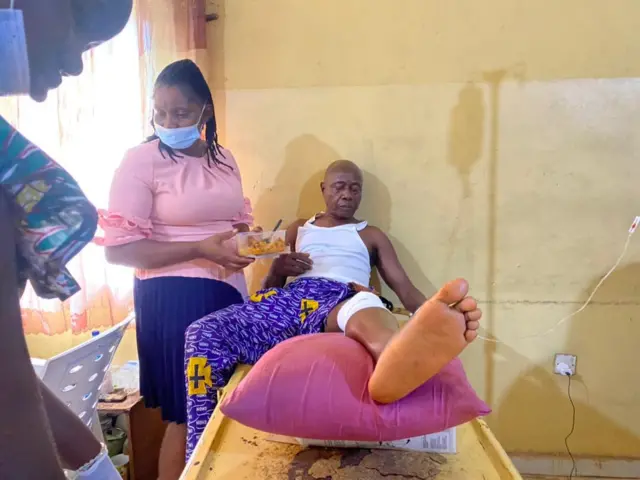
Nigeria is facing worsening violence by armed groups.
Across the country, people are worried over the inability of the government to tackle the rising levels of insecurity.
The authorities have vowed to track down the killers.
 BBC Monitoring
BBC Monitoring
The world through its media
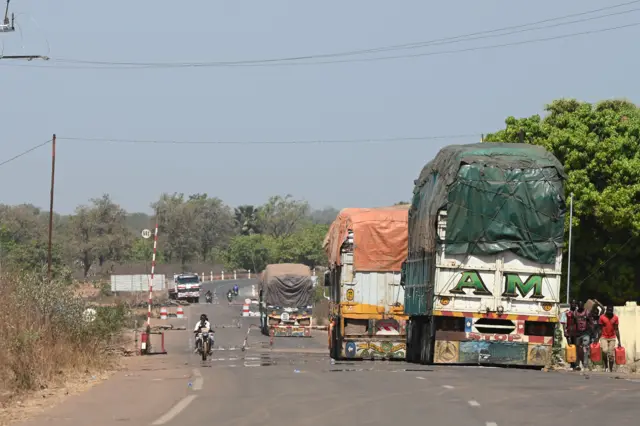 Image source, AFP
Image source, AFPMali has been under sanctions imposed by the West African regional group Ecowas
Mali has expressed disappointment at the decision by the West Africa regional group, Ecowas, to maintain crippling economic sanctions on the Sahel country.
Malian Foreign Minister Abdoulaye Diop told state-owned ORTM that he hoped the Ecowas would revisit the issue at its summit next month.
Ecowas deferred its decision on proposed transitional periods in Mali, Guinea and Burkina Faso to 3 July after its summit of heads of state in Accra, Ghana, on Saturday.
French public radio RFI reported that Ecowas leaders had differed over the proposed transitional periods in the three countries.
It reported that the traditional consensus was not reached between states over the 24 months of transition proposed by the Malian junta.
Regarding Burkina Faso, Ecowas leaders rejected a proposed 36-month transition, which they have considered too long.
Ecowas appointed former Niger President Mahamadou Issoufou as mediator for Burkina Faso.
Ecowas also rejected a 36-month proposed transition in Guinea and gave the country a month to review its timetable.
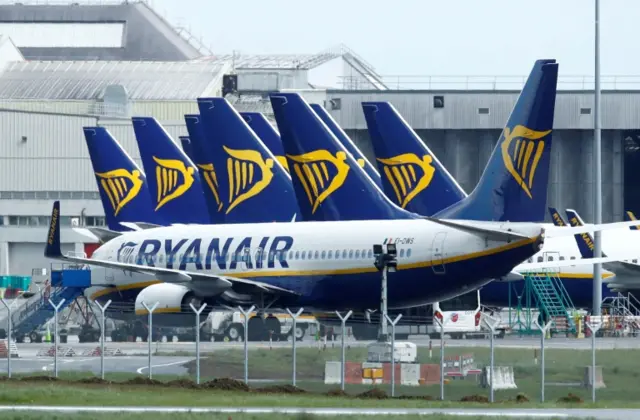 Image source, Reuters
Image source, ReutersOne of Europe's biggest short-haul airlines is imposing new rules on South African nationals that have drawn condemnation.
Dublin-based carrier - RyanAir - says South African customers will have to take an Afrikaans test to prove their nationality before boarding flights The airline flies in Europe and North Africa.
The test includes questions about who is the president, what is the capital city and which side of the road do motorists drive on.
The airline said those passengers unable to complete it would be refused travel and issued with a refund.
The carrier said the rules were meant to deal with “high prevalence of fraudulent South African passports”, according to a company spokesperson quoted by British media.
South Africa has 11 official languages - Zulu, Xhosa, Afrikaans, Sepedi, Setswana, English, Sesotho, Xitsonga, Siswati, Tshivenda and Ndebele.
The chief executive officer of the Afrikaans Language Board, Conrad Steenkamp, has described the move as “absurd”, and that he doesn't understand why RyanAir singled out Afrikaans, as the country has 11 official languages.
Jared Ruttenberg, a journalist in South Africa, says the test “will be a deeply triggering thing for many South Africans to be told that they need to complete this in a language that they cannot do”.
"The British High Commissioner and even the Irish government have responded and said this is not a requirement on their behalf," he said.
"There's been disbelief and anger... in South Africa we have a very difficult past when it comes to languages and for many people would associate Afrikaans with the previous government [apartheid] regime."
Samba Cyuzuzo
BBC Great Lakes
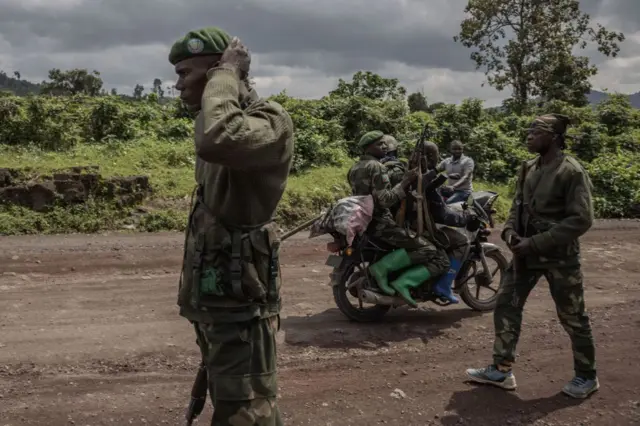 Image source, AFP
Image source, AFPFighting between government soldiers and the rebels is ongoing in eastern DR Congo
Democratic Republic of Congo President Felix Tshisekedi has said “there’s no doubt” that Rwanda supported M23 rebels in clashes in the east of his country that have displaced tens of thousands.
Rwanda has consistently denied accusations of backing the rebels.
On Monday, there was renewed fighting between the Congolese army and the rebels in Rutshuru area.
An M23 spokesperson said the army started bombarding their positions in Jomba area early in the morning.
Mr Tshisekedi's claims on Rwanda's meddling were his first in recent times as tensions continue to rise between the eastern Africa neighbours.
The president spoke on Sunday after visiting neighbouring Congo-Brazzaville where he met his counterpart Denis Sassou Nguesso.
He emphasised that although he wanted peace with Rwanda, DR Congo's neighbours “should not mistake our desire for peace with weakness”.
"I hope that Rwanda has learned this lesson because today, it's clear. There is no doubt Rwanda has supported the M23 to come and attack the DRC," he said.
A Rwanda government spokesperson has told the BBC that this “is an internal crisis that Rwanda is not involved in” .
Last Monday, M23 rebels retreated from areas it had captured in the Congolese province of North Kivu. But on Friday it warned that the army was planning renewed attacks against its positions.
In May, nearly 100,000 people fled their homes as the army clashed with the rebels near Goma town, the provincial capital.
Angola's President João Lourenço is organising a summit between President Tshisekedi and Rwanda’s President Paul Kagame to ease the tensions, his office said last week.
Mike Thomson
BBC World Service Newsroom
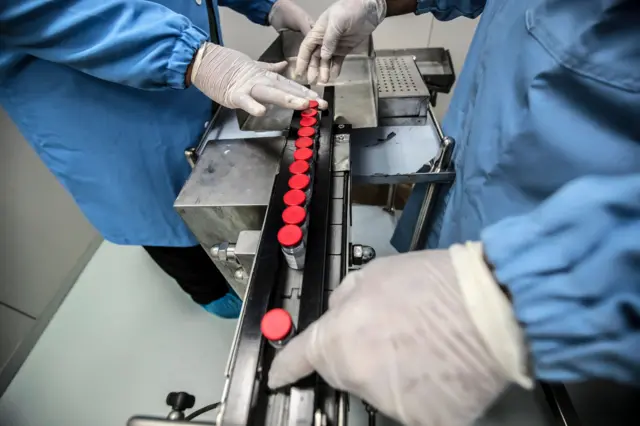 Image source, AFP
Image source, AFPEgypt will provide the Covid vaccine doses through the African Union
The president of Egypt has promised to provide 30 million doses of coronavirus vaccine to African countries, in coordination with the African Union.
Abdul Fattah al-Sisi made the announcement at the first pan-African health conference, which is being held in the Egyptian capital, Cairo.
Around 400 health officials, along with medical companies working in more than 100 countries, are attending the event.
President Sisi said that although Egypt had limited resources like other African countries, it was ready to cooperate with them all.
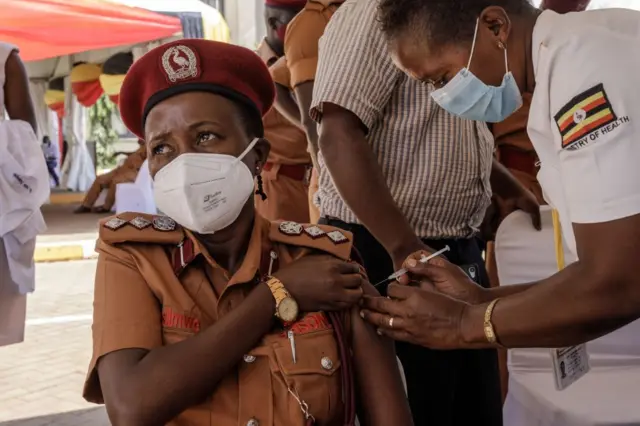 Image source, AFP
Image source, AFPThe minister said the authorities will ramp up vaccination
Uganda's health minister says the country's Covid-19 cases have risen to levels last witnessed in June 2021 when the Delta variant was prevalent.
In a tweet, Minister Jane Aceng did not reveal the latest figures on confirmed cases, but said the country was "well prepared to respond and save lives than before".
She also ruled out travel restrictions or lockdowns in any parts of the country under the current circumstances.
"We will optimise the existing control and mitigation tools at personal and community levels.
"These measures include: vaccination for all individuals, wearing of face masks at all times especially for the vulnerable population and hand washing," she said, external.
Uganda fully reopened the economy in January after imposing one of the world's strictest lockdowns during the pandemic, which saw schools remain closed for almost two years.
 BBC World Service
BBC World Service
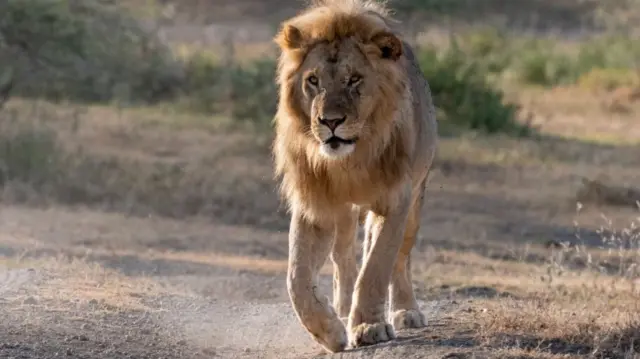 Image source, Getty Images
Image source, Getty ImagesTanzania's wildlife are popular with tourists
Tanzania's government is reversing its controversial decision to lift a ban on wildlife exports.
The order to roll back the embargo was only announced two days ago, and had been heavily criticised by activists.
The law was introduced in 2016 to help prevent protected animals being smuggled out of the country by poachers.
Wildlife authorities had planned to allow exports for six months so traders could "clear stocks of animals" that they hadn't been able to sell.
But Tanzania's Minister of Tourism and Natural Resources Pindi Chana said the ban would be reinstated until a further decision had been made.
Tanzania is known for its wildlife safaris that draw large numbers of tourists.
 BBC World Service
BBC World Service
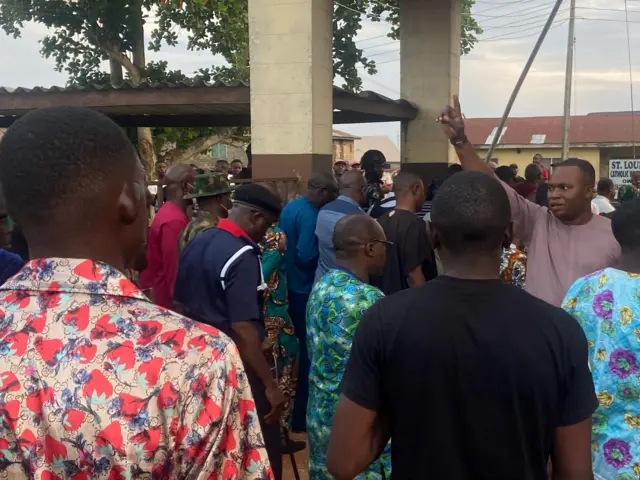 Image source, Reuters
Image source, ReutersRelatives of the attack victims gathered at the church in Owo in Ondo state
Pope Francis has prayed for the victims of an attack on a Nigerian church in which it is believed at least 25 worshippers were killed by gunmen.
A Vatican statement said he had learned of the deaths of dozens of people.
The assault took place in the southern town of Owo, in Ondo state.
Officials there have warned the number of casualties could rise.
They say members of the congregation were abducted by the gunmen, whose identities are unknown.
Nigeria's President Muhammadu Buhari has condemned the attack calling it "heinous".
A week ago, the head of the country's Methodist church was kidnapped; he was released after a ransom was paid.
Our proverb of the day:
Quote MessageIt's already morning in the east."
A Dinka proverb sent by Angelo Ngor Ngong Wol in Kuajok, South Sudan.
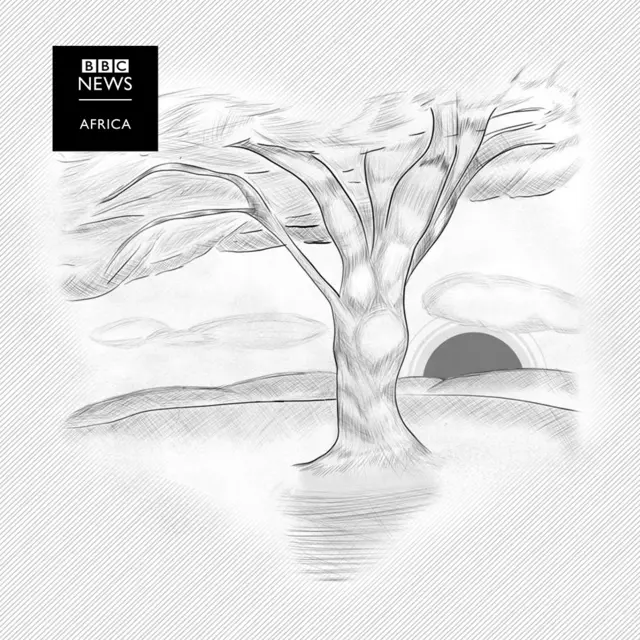
Africa's first filmmakers boldly revealed how, and why, colonialism lived on after the independences. Sarah Jilani takes a closer look at the works of Ousmane Sembène and Souleymane Cissé. The Malian director's 1982 film Finye (the Bambara word for wind) considers students as the winds of change, whilst Sembène's Mandabi, made in 1968, takes its title from a Wolof word deriving from the French for a postal money order – le mandat postale. Adapting his own novel about the frustrations of bureaucracy, the Senegalese director made the decision to make the film in the Wolof language.
Sarah Jilani teaches at City, University of London and was chosen as a 2021 New Generation Thinker on the scheme run by BBC Radio 3 and the Arts and Humanities Research Council which makes research into radio. You can hear her discussing another classic of African cinema on Free Thinking in this episode about Touki Bouki https://www.bbc.co.uk/programmes/m0013js4 and Satyajit Ray's Indian Bengali drama Jalsaghar, which depicts a landlord who would prefer to listen to music than deal with his flood ravaged properties https://www.bbc.co.uk/programmes/m000v9gj
Producer: Torquil MacLeod